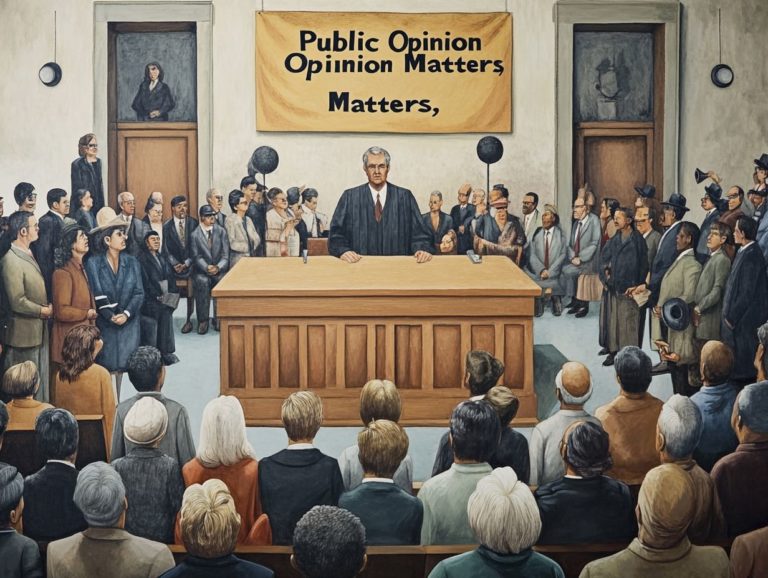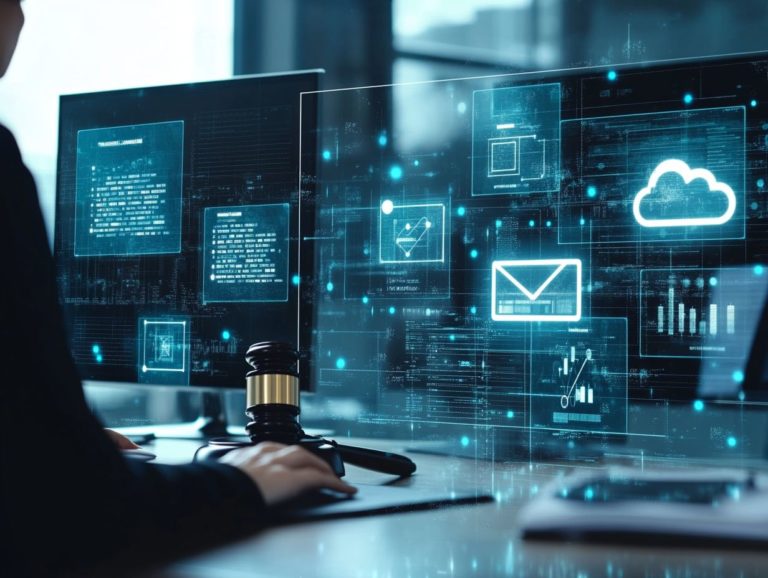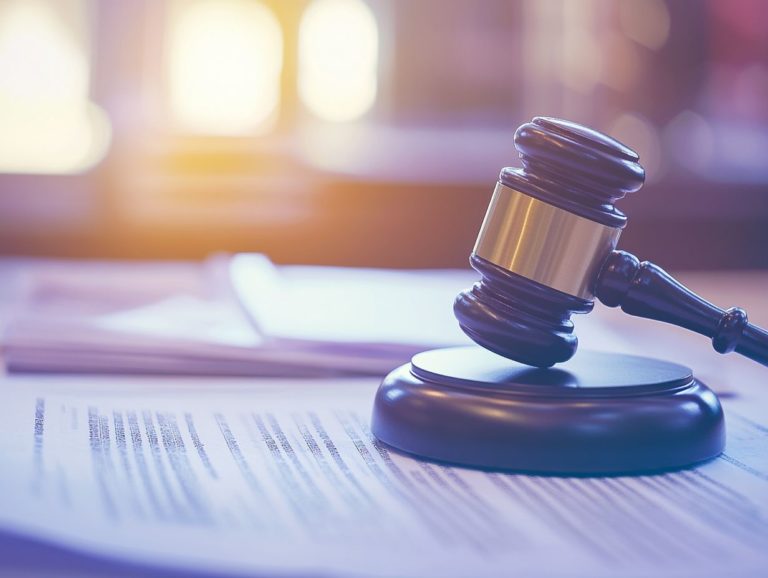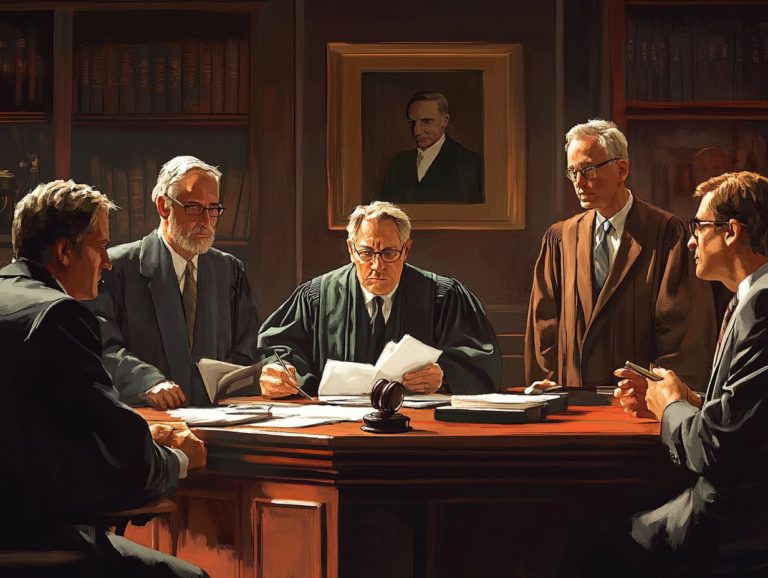How to Evaluate an IP Litigation Attorney
Choosing the right intellectual property (IP) litigation attorney is vital for safeguarding your intellectual property rights.
Given the complexities of IP law, having an experienced advocate can significantly influence the outcome of your case.
This article delves into the essential qualities you should seek in a capable attorney, the factors to weigh during your evaluation, and the pivotal questions to pose in an initial consultation.
Arm yourself with the knowledge necessary to make an informed decision and protect your innovative creations.
Contents
- Key Takeaways:
- The Importance of Choosing the Right IP Litigation Attorney
- Qualities to Look for in an IP Litigation Attorney
- Factors to Consider when Evaluating an IP Litigation Attorney
- Questions to Ask During the Initial Consultation
- Preguntas Frecuentes
- Qu debo buscar al evaluar a un abogado de litigios de propiedad intelectual?
- C mo puedo determinar la experiencia de un abogado de litigios de propiedad intelectual?
- Qu tipo de conocimiento debe tener un abogado de litigios de propiedad intelectual?
- Por qu son importantes las habilidades de comunicaci n y negociaci n?
- Por qu es importante la reputaci n de un abogado?
- C mo puedo evaluar los costos de un abogado de litigios de propiedad intelectual?
Key Takeaways:
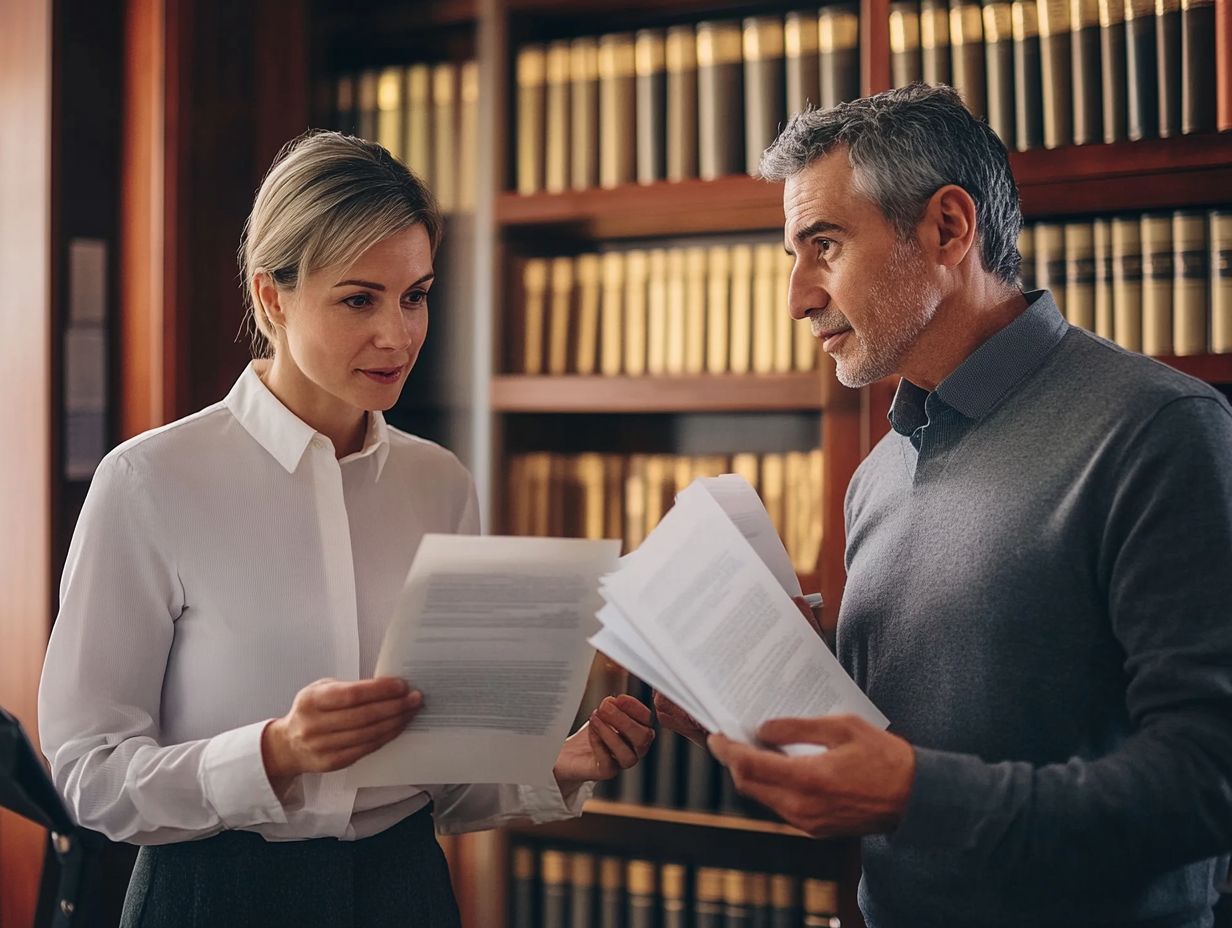
- Choose an IP litigation attorney with experience and success in IP law.
- Look for good communication skills and a reasonable cost structure.
- Evaluate an attorney’s track record, availability, and compatibility with your needs and trust.
- Ask questions during the initial consultation to clarify their experience, approach, potential strategies, and the attorney-client relationship.
The Importance of Choosing the Right IP Litigation Attorney
Selecting the right IP litigation attorney is crucial for safeguarding your intellectual property rights, especially in patent, copyright, and trademark litigation. A solid understanding of how to prepare for an IP litigation case can also greatly enhance your chances of success.
An experienced attorney not only understands the subtleties of various legal frameworks but also possesses the expertise to navigate the complexities of IP infringement claims.
With a focus on robust IP strategies, they assist in optimizing your IP portfolio and securing exclusive rights to your innovative ideas. This ultimately enhances your brand and economic value.
Their insights can lead to successful outcomes in civil court, ensuring your creative works are protected from unauthorized commercial exploitation.
Understanding the Role of an IP Litigation Attorney
An IP litigation attorney is essential for protecting your legal rights concerning intellectual property. They navigate the intricate terrain of legal disputes and ensure compliance with patent office regulations, highlighting the importance of IP education in litigation.
This professional represents both plaintiffs and defendants in infringement cases, skillfully maneuvering through legal precedents and evidence to advocate for your rights.
They negotiate licensing agreements that foster business relationships and shield your proprietary information from unauthorized use.
During legal disputes, your attorney provides critical guidance, helping you understand your options and the potential implications of your decisions.
For instance, in a recent high-stakes case, an IP litigation attorney effectively defended a tech startup against infringement claims from a major corporation, showcasing their expertise and commitment to safeguarding innovation.
Qualities to Look for in an IP Litigation Attorney
When searching for an IP litigation attorney, prioritize qualities that ensure exceptional representation, including knowing how to find the right expert for IP litigation.
Look for someone with a proven track record in handling similar disputes and deep expertise in intellectual property law. These attributes will significantly enhance your chances of a favorable outcome.
Experience and Expertise in IP Law
Your choice of litigation attorney hinges on their experience and expertise in IP law. Understanding how to track IP litigation trends effectively is essential for navigating the landscape of intellectual property rights successfully.
An attorney well-versed in this field comprehends the subtleties of intellectual property legislation and brings valuable insight from managing high-stakes cases.
Imagine a prominent tech company successfully defending its patent rights against a larger competitor, thanks to the attorney’s astute litigation strategy. Such expertise guarantees that your creative works whether innovative designs or distinctive trademarks receive the strong legal protection they deserve.
Moreover, effective management of IP portfolios is key; an experienced attorney crafts comprehensive strategies to safeguard and enhance the value of your intellectual assets, protecting your interests in a rapidly changing market.
Contact an IP litigation attorney today to ensure your creative innovations are fully protected.
Track Record of Success
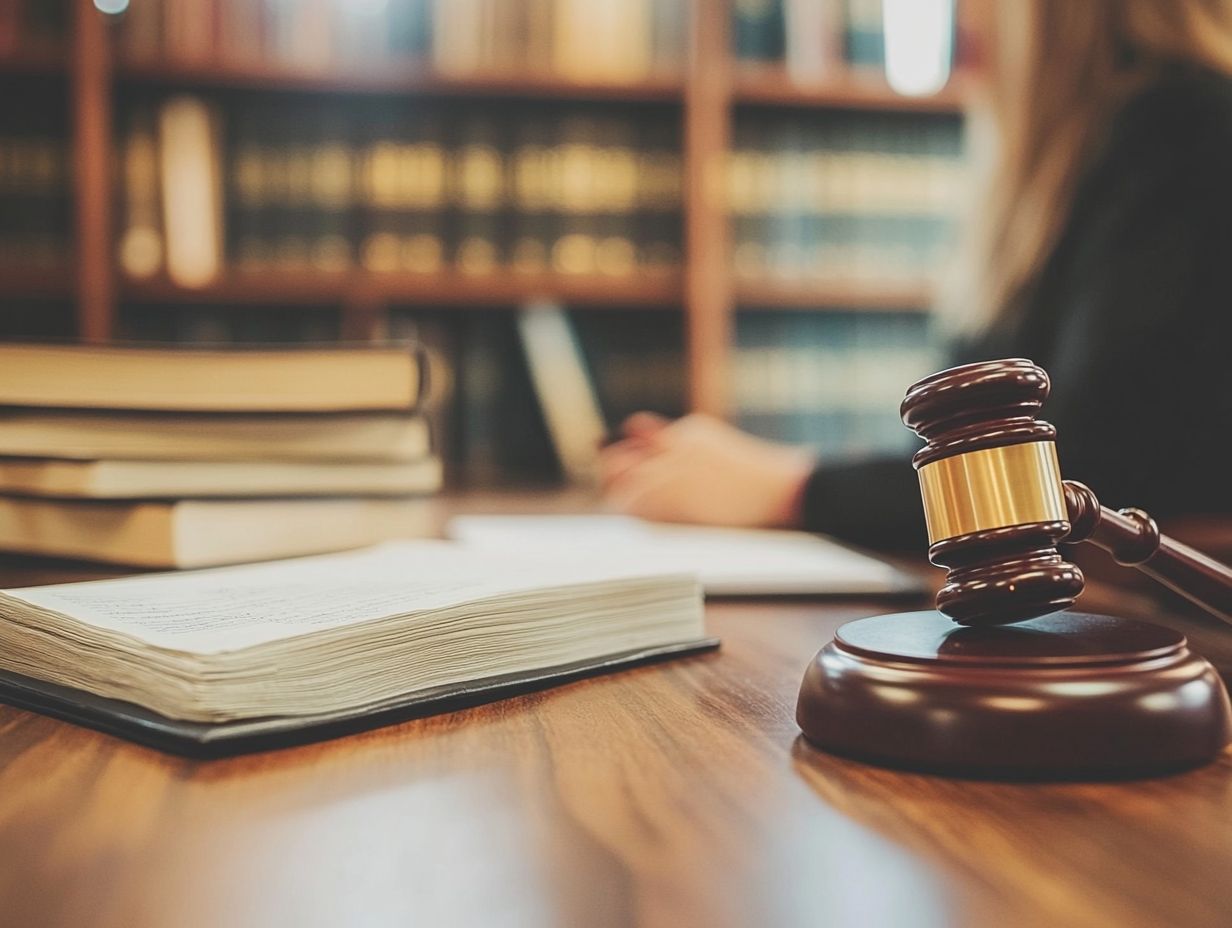
A strong track record of success is a crucial marker of an effective IP litigation attorney. It highlights their skill in winning cases and securing favorable outcomes for clients.
When evaluating an attorney s past performance, examine various metrics. Look at the percentage of cases won, notable settlements they ve achieved, and feedback from previous clients.
Gather statistics on the types of intellectual property issues they specialize in. This can provide valuable insights into their expertise.
Client testimonials can show an attorney’s approachability and dedication qualities that build trust.
A proven success rate naturally boosts your confidence in the attorney’s ability to handle complex litigation effectively.
Effective Communication Skills
Effective communication skills are essential for you as an IP litigation attorney. They enable you to engage clearly with clients and other legal stakeholders, ensuring everyone is on the same page regarding legal strategies.
This kind of dialogue builds trust and allows you to understand the details of your client’s situation. This understanding ensures that tailored solutions can be created.
For instance, when a client voices concerns about potential patent infringements, you can respond with targeted advice that directly addresses their worries. This fosters a proactive approach to the matter at hand.
Your ability to articulate complex legal concepts in a way that s easy to understand can significantly enhance your client s comfort level throughout the litigation process.
Regular communication creates an environment where clients feel valued and empowered. This ultimately leads to a more collaborative effort in achieving favorable outcomes.
Factors to Consider when Evaluating an IP Litigation Attorney
When you evaluate an IP litigation attorney, consider several key factors.
Focus on the cost, their availability, compatibility, and the level of trust that develops during your initial interactions. Each element plays a crucial role in ensuring you make the best choice for your needs.
Cost and Fees
Cost and fees play a vital role in your decision-making when selecting an IP litigation attorney. These expenses can vary dramatically based on the attorney’s experience, the complexity of your case, and the specific legal services being offered.
As you navigate the intricate landscape of the legal industry, you’ll encounter various fee structures. These include hourly rates, retainer agreements, and contingency fees, which mean you only pay if you win your case. Each model has its own advantages and disadvantages.
Understanding how these costs could impact your budget and overall case strategy is crucial. For example, while hourly rates provide predictability, they can sometimes escalate unexpectedly. On the other hand, contingency fees align your attorney’s incentives with your success.
This can give you peace of mind while planning for legal costs. Ensure you receive quality services without overspending, all while maintaining financial clarity throughout the process.
Availability and Responsiveness
The availability and responsiveness of your IP litigation attorney can profoundly influence the outcome of your legal disputes. Timely communication is paramount and often paves the way for more effective strategic planning, including knowing how to prepare an IP litigation budget for your case.
When you find yourself in urgent situations, having an attorney who is readily accessible can make all the difference in addressing your pressing concerns promptly and effectively. A proactive attorney anticipates potential challenges and strategizes accordingly, reassuring you during critical moments.
During your initial consultation, assess how swiftly the attorney responds to your questions and requests. This responsiveness can indicate their commitment to client service. Pay attention to their past examples of responsiveness and inquire about their communication policies.
This will help you understand how they handle urgent matters. Ultimately, it contributes to a more effective partnership that supports your legal needs.
Compatibility and Trust

Compatibility and trust between you and your IP litigation attorney are fundamental for nurturing a productive attorney-client relationship. This, in turn, profoundly influences the effectiveness of your legal representation.
To gauge this compatibility, initial meetings and interviews are crucial. During these discussions, you should feel at ease sharing sensitive information about your intellectual property concerns. It’s vital for attorneys to create a space where you can talk openly, allowing you to voice your worries without reservation.
Establishing a relationship grounded in transparency and mutual respect is key to cultivating trust. Employing active listening techniques such as acknowledging your insights and clarifying any uncertainties can further solidify this connection.
This rapport not only enhances communication but also ensures that both you and your attorney are aligned in your objectives. Ultimately, this leads to more effective legal strategies.
Questions to Ask During the Initial Consultation
In your initial consultation with an IP litigation attorney, it’s essential to ask the right questions. This will help you assess their expertise, understand their approach to IP litigation as a plaintiff, and determine how well they align with your legal needs.
Clarifying their Experience and Approach to IP Litigation
Clarifying an IP litigation attorney’s experience and approach is essential for determining their fit for your unique legal needs and objectives. By exploring the attorney’s background, you gain valuable insight into their expertise across various dimensions of intellectual property law, including patents, trademarks, and the role of attorneys in IP litigation success.
It’s equally important to assess their specialization within IP law, as this can significantly influence the strategies they employ. For instance, an attorney with a robust background in patent litigation is likely to tackle a case differently than one who excels in trademark disputes. Understanding key factors in IP litigation can also provide valuable insights into their approach.
Understanding these nuances empowers you to anticipate potential outcomes. An experienced attorney with a well-crafted case strategy could pave the way for a favorable resolution, while a more generic approach may lead to prolonged litigation or an unsatisfactory settlement.
Discussing Potential Strategies and Outcomes
Engaging in a dialogue with an IP litigation attorney about potential strategies and outcomes empowers you to set realistic expectations while aligning your business objectives with their legal expertise.
It s crucial for you to understand the range of legal strategies available in intellectual property disputes if you wish to safeguard your innovations effectively. By exploring various avenues like negotiation tactics, settlement options, and trial preparations you can navigate the complexities of litigation with greater confidence.
Exploring alternative dispute resolution methods can also provide viable solutions that help minimize both the time and costs typically associated with a court trial. This comprehensive approach not only mitigates risks but also significantly enhances your chances of achieving favorable results that resonate with your long-term business ambitions.
Understanding the Attorney-Client Relationship
Understanding the attorney-client relationship is crucial for effective collaboration during IP litigation. Trust and open communication form the bedrock of successful legal representation.
Engaging in transparent dialogue is essential, allowing both parties to establish a framework that nurtures mutual understanding and respect. As a client, it s important to express your goals and concerns candidly, while your attorney should provide guidance that clarifies legal options and potential outcomes.
This dynamic ensures that you feel valued and empowers your attorney to craft strategies that align closely with your objectives. By setting clear expectations regarding timelines, deliverables, and fees, you can significantly reduce misunderstandings.
This approach fosters a more productive working environment, ultimately leading to higher-quality legal services.
Preguntas Frecuentes
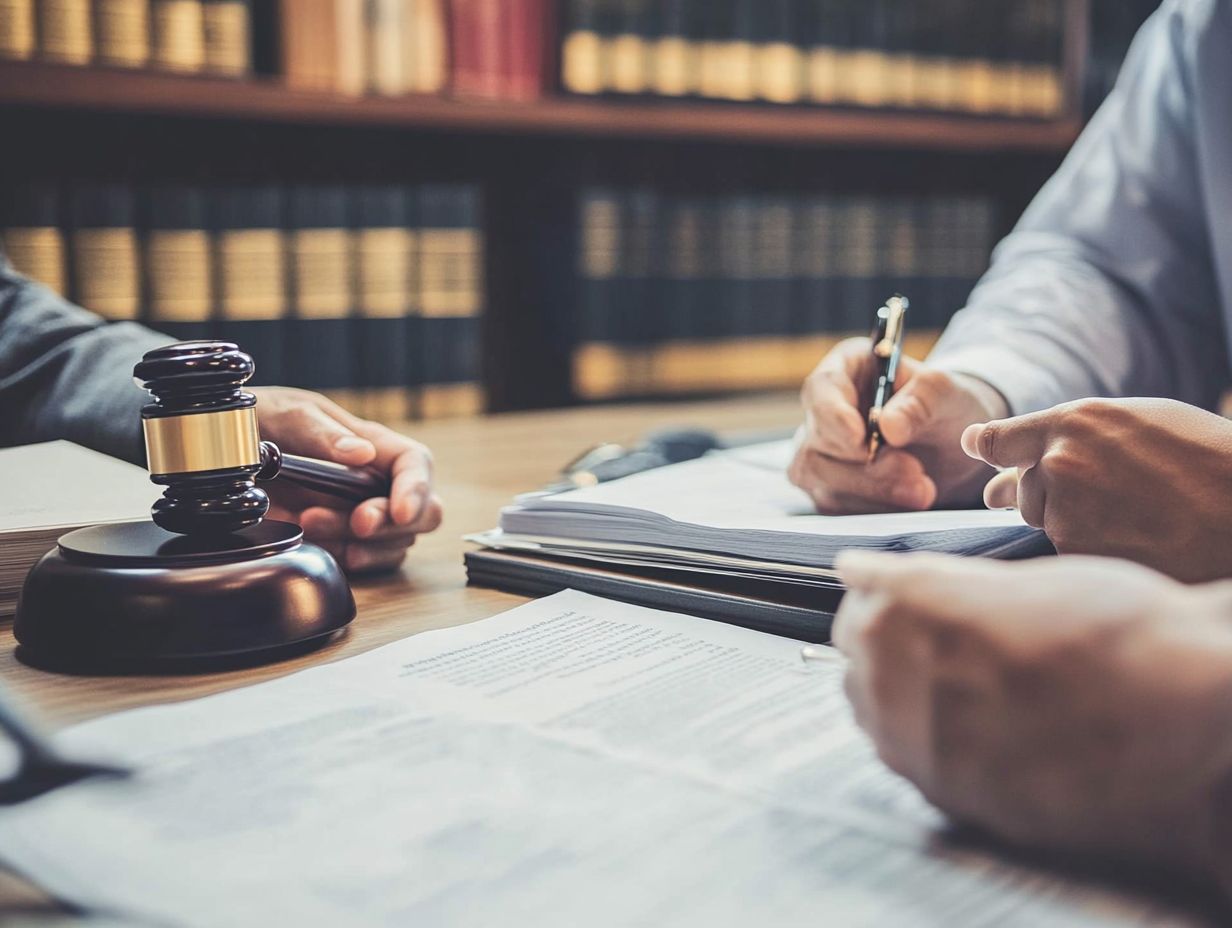
Qu debo buscar al evaluar a un abogado de litigios de propiedad intelectual?
Al evaluar a un abogado, busca su experiencia en casos de propiedad intelectual y su conocimiento de las leyes relevantes. Tambi n examina su habilidad para comunicarse y negociar, as como su reputaci n en el campo legal.
C mo puedo determinar la experiencia de un abogado de litigios de propiedad intelectual?
Investiga los casos pasados y resultados del abogado. Revisa sus a os de pr ctica y tasa de xito, y pide referencias de clientes.
Qu tipo de conocimiento debe tener un abogado de litigios de propiedad intelectual?
Un abogado debe entender bien las leyes de propiedad intelectual, incluyendo patentes, marcas registradas y derechos de autor. Tambi n deben conocer las tendencias del sector y cambios en el mercado que puedan afectar tu caso.
Por qu son importantes las habilidades de comunicaci n y negociaci n?
Las habilidades de comunicaci n y negociaci n son esenciales. Un buen abogado puede comunicarse eficazmente con jueces, jurados y partes contrarias, adem s de negociar acuerdos favorables.
Por qu es importante la reputaci n de un abogado?
La reputaci n de un abogado puede influir en el resultado de tu caso. Un abogado respetado tiene un historial s lido, lo que puede a adir credibilidad y conducir a resultados m s favorables.
C mo puedo evaluar los costos de un abogado de litigios de propiedad intelectual?
Discute la estructura de tarifas y opciones de pago del abogado. Considera no solo las tarifas iniciales, sino tambi n costos adicionales como tarifas judiciales o de testigos expertos.


